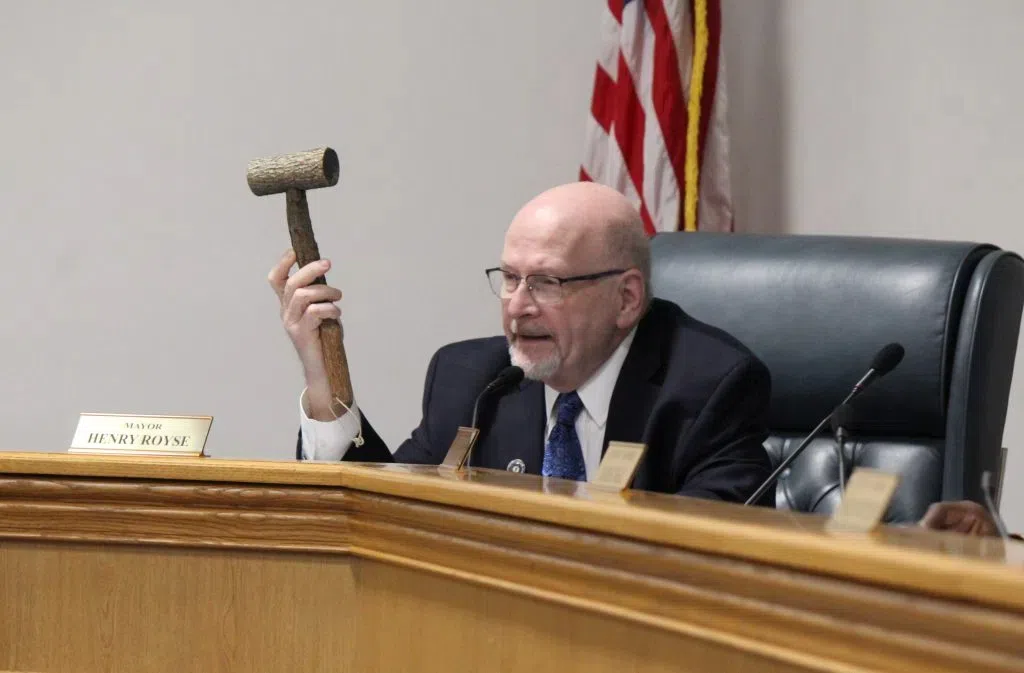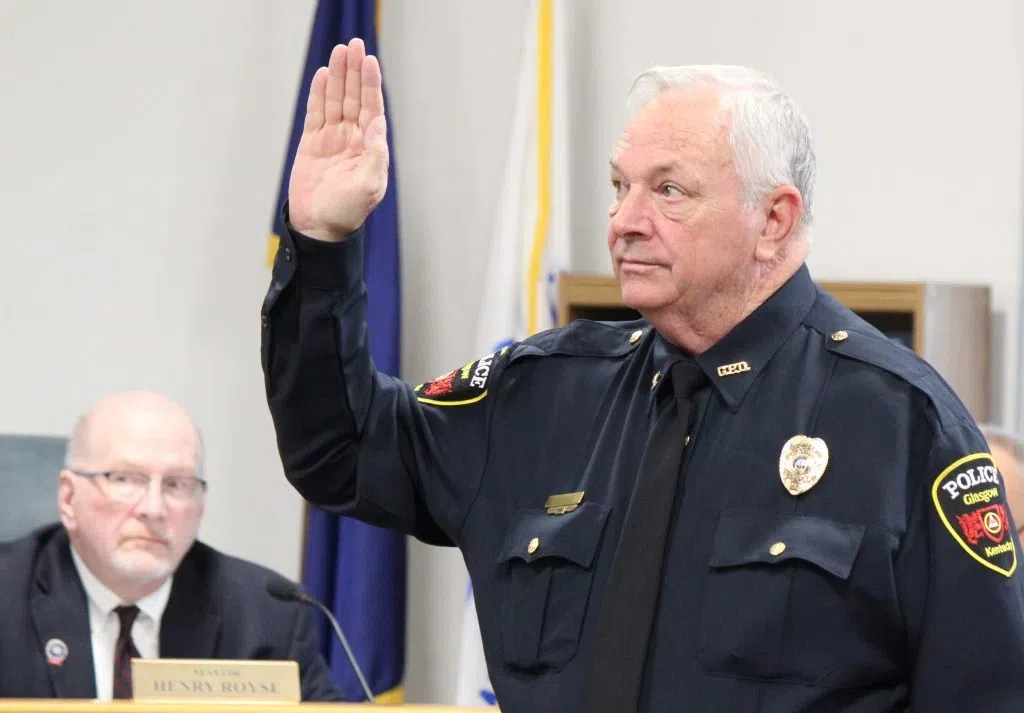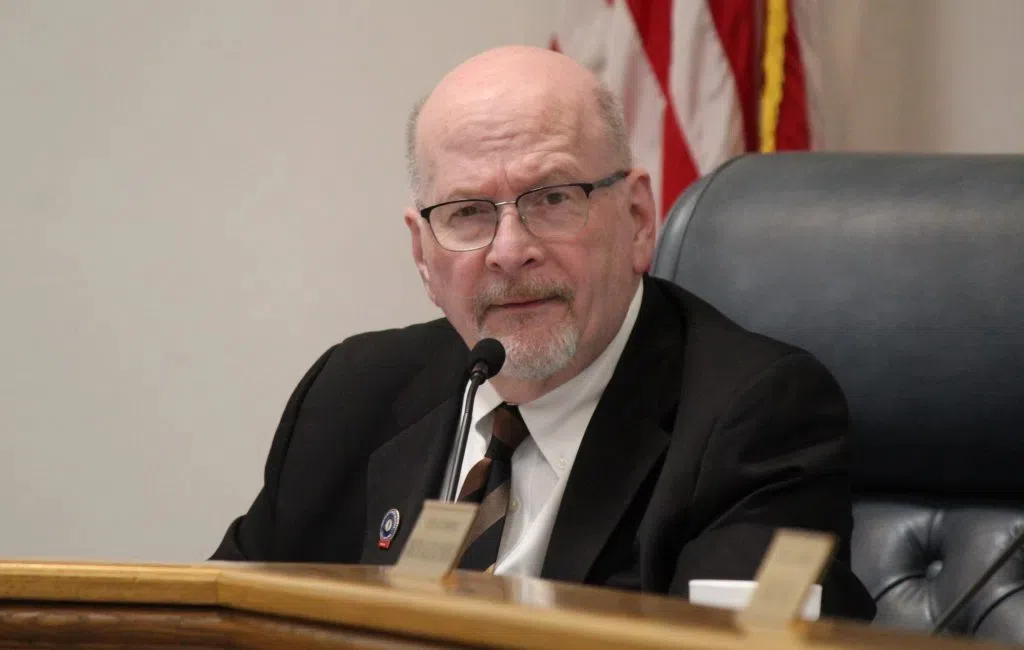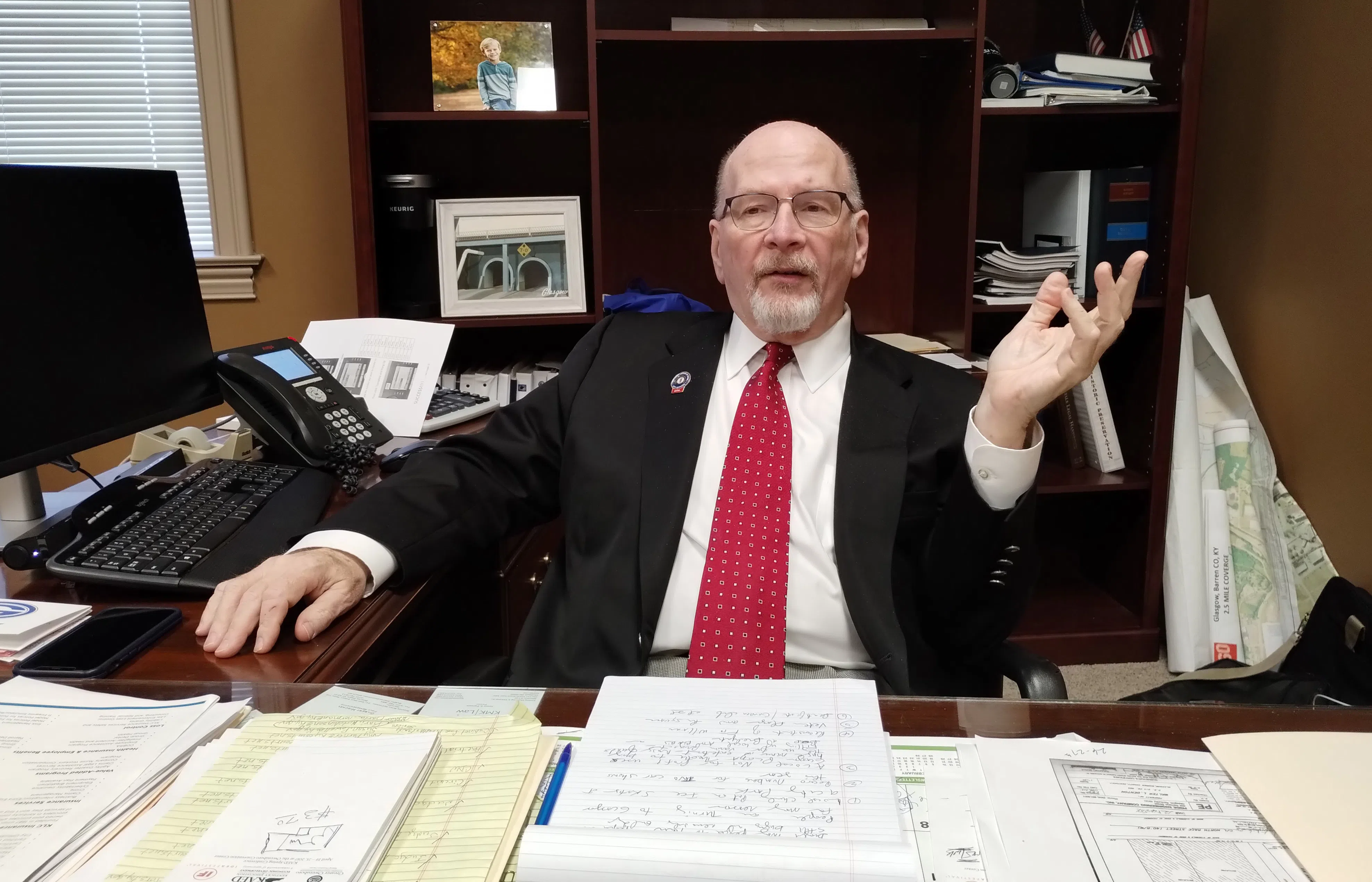By MELINDA J. OVERSTREET
for Glasgow News 1
As Glasgow Mayor Henry Royse was about to conclude his first year in the role, he had plenty to say about some of the things that have changed and some that haven’t.
He was asked about a thing that surprised him most or was the most unexpected as he got settled in the job.
“I can tell you it’s the hardest job I’ve ever had,” Royse said, “because people depend on the city for so much, and what that translates into is that the mayor’s office kind of becomes a complaint department. … I never realized that so many services the city provides run through the City Hall.”
For example, some of those have to do with code enforcement issues, because it’s sort of the job of the person charged with handling those “to make some people mad,” he said, if they’re not keeping their property up. He said Sheryl Pena is the best at that job and shows no favoritism, and when she writes a citation, his phone starts ringing. Those folks are usually quick to point out some of their neighbors’ properties they believe are in worse shape, Royse said, and he has to remind them it’s their own property that’s the issue at that point.
“Probably the other surprise is the homeless problem,” he said.
He believes that the problem itself has “exploded” in the past eight or nine months, but he concedes that it could also be that awareness has increased.
“The surprise is, there is no real solution,” Royse said.
He said that about five weeks ago, the Kentucky League of Cities hosted a statewide Zoom meeting so people from various cities could share how they were addressing the issue.
“The most shocking thing was – I expected someone to come on there and say, ‘Here’s what you need to do. You do this and that.’ – There is no solution that’s working,” he said.
In Louisville, they have a facility that can bed 750 people per night, and the average census is 1,500. Churches, volunteer organizations and others continue to try to find a way to help.

At his first regular meeting presiding as Glasgow mayor, Henry Royse holds up a dogwood gavel and tells about the day its maker, Jim Nelson, who died in June, presented it to Royse so he would have it when he took office, as Nelson was sure Royse would win the election. GN1 file photo
“Whenever there is something that works, I mean, the city would love to buy into and be a part of the solution,” he said, “but pushing a shopping cart along Broadway is not illegal. We’ve had situations where people were sleeping under the bridge at Gorin Park, and they trashed it up with all types of personal belongings. We went down there and cleaned it up, and they complained because we took away their belongings. There’s no solution in that, you know? … We are very much trying to learn.”
He said that simply providing temporary shelter doesn’t resolve the underlying issues.
“It’s all about accountability. You can’t give somebody a place to live forever, you’ve got to work the system,” the mayor said, and he spoke of the work Bridge Kentucky does to help people find resources for longer-term solutions as best they can.
He said he gets calls from people upset not that people are homeless, but that they’re homeless in places that have a lot of visibility, because then it’s in “their back yard.”
He mentioned the lack of affordable housing and the need for more types of jobs as contributing to the issue.
“I think the real answer is, there’s always that element that we’ve just got to try to provide for,” Royse said.
At the same time, though, all options for resources need to be explored and those being assisted need be accountable.
But people who have perhaps made a bad decision or two that led them into these circumstances should not be scorned for the rest of their lives, the mayor said.
“I wish we could be the ones that invent the solution,” Royse said.
Aside from those things that were degrees of surprising, one of the hardest things he’s had to learn is how competitive the workforce is in terms of attracting and keeping good people, and younger people often don’t see the value of benefits such as insurance and retirement when they need more cash in their pockets up front.
“To win the game, we’ve got to keep good players on the team, and so we’ve got to be competitive and make sure that we don’t lose good people, and we’ve got to make it an enjoyable place to work,” he said, and a lot of that means employees need to feel good about working for their respective supervisors. “The people in management positions here really care about their people. It’s amazing really.”
Significant personnel decisions
“Things needed to be done,” Royse said. “Being a mayor is kind of like being a new coach. You’ve got to get everybody on the same team, and that requires analyzing what every team member does and their skill set individually and how they work together as a team. I hate to use the football analogy, but we’re all headed toward the same goal line, to make Glasgow a really nice place to live, a nice place to work, a nice place to raise a family, a nice place to attract industry, a nice place to attract retail, but each of the individuals on the team has a role, and the team doesn’t win unless everybody’s doing their job.”
He said that overall, once he’d ascertained how everyone was doing in those roles, he really didn’t have much to address.
Within the first month after he started his role as mayor, Royse removed Roger Simmons as the superintendent of the Department of Public Works and also fired Simmons’ brother who worked at the city’s landfill, and he named April Russell to fill the role on an interim basis. The initial posting of the position did not yield the desired results, so the announcement was tweaked and readvertised. Jim McGowan, who had more than 19 years’ experience with Glasgow-based American Engineers Inc., was hired in July.
Russell was and still is the city’s grant writer and manager, and she had also been the stormwater manager. Once McGowan had had a little time to settle into his new role, Royse named Russell as full-time city administrator, moving her to City Hall.
He spoke at length about how pleased he is to have McGowan and Russell in those positions.

Glasgow Mayor Henry Royse, from left, watches as Circuit Judge John T. Alexander (not pictured) administers the oath of office to returning Glasgow Police Department Chief Guy Howie during the April 24 Glasgow council meeting. GN1 file photo
The position of chief at the Glasgow Police Department has rotated over at least the past decade in Glasgow roughly as frequently as mayoral terms have, and this time is no exception.
Former GPD Chief Guy Turcotte had stepped down from that position just as then-Mayor Rhonda Riherd Trautman was ending her term as 2014 drew to a close, but he remained employed by the department. James Duff, who had been a GPD lieutenant, served as interim chief until Howie started the top departmental role under then-Mayor Dick Doty’s administration. Arbogast was named chief in 2019 by then-Mayor Harold Armstrong, as Howie was retiring with a plan to move back to Hopkinsville, where he had previously served as police chief and still had family members residing.
In mid-February of this year, Royse asked for the resignation of Jennifer Arbogast from her post as chief but then agreed to allow her to retire at the first of April instead. Roughly a month later, the mayor appointed, with approval from the city council, Guy Howie to return to the post beginning April 17.
Meanwhile, Turcotte had been in different roles within the department, most recently detective. Early this year, however, he was accused by a Barren County resident of inappropriately touching her while he was a customer at her workplace, and she sought and got an interpersonal protective order against him. Turcotte was initially placed on administrative leave with pay and then without pay, as he was later served with a complaint for a criminal misdemeanor charge. After Turcotte was advised that his employment with the department was to be terminated, he requested a hearing before the mayor under a Kentucky law that protects certain rights of law enforcement officers, but he did not attend it, and ultimately Royse upheld the termination. Turcotte is suing in response. Both the misdemeanor charge and the civil lawsuit are still pending in the court system.
Communication
Royse, who has a mass communications degree from Western Kentucky University and has worked in the broadcasting field for decades, has sought to improve various aspects of city communications – among those in both the administrative and legislative branches of city government and from city leaders to the community at large, for example.
One of his goals going into office was to get the agendas for council meetings distributed earlier to give the council members more time to prepare, so the deadline to get things on the agenda got moved, there is now a “drop-dead deadline of Thursday afternoon.”
“Nothing can change from Thursday to Monday night,” he said.
“People work different hours, different days, stuff like that. You can’t be an effective council member if you don’t have time to read over the agenda and the documents that are attached to it,” the mayor said.
Once in a regular council meeting on either the second or fourth Monday of each month, any business items that have arisen in the interim that need to be addressed that night can be brought forth and the agenda amended. Generally, though, the approach has helped curb the addition of last-minute wild-card items over the weekend, which helps maintain order and credibility at the meetings. He said the community, in order to grow, has to move past the reputation it was getting for meetings that were potentially full of tension and drama and viewed for entertainment.

Glasgow Mayor Henry Royse presides over a meeting of the Glasgow Common Council in March. GN1 file photo
“That has been absolutely terrible,” he said. “We’ve got to have good things happen.”
He began naming some of well-received and/or well-attended events and other occurrences, such as movies being filmed locally.
Royse also changed the time of the regular meetings from 7 p.m. to 6 p.m.
The department heads meet every week to discuss what’s going on in their respective areas and particularly any impact that may have on the others.
Perhaps the biggest new communication tool the mayor has incorporated is a podcast called Dashboard Dialogues. The series of recorded interviews that launched Nov. 7 now has six episodes that can be heard wherever folks get their podcasts and are also shared via the city’s social media accounts – another tool used heavily, to some extent with the guidance of a paid consultant. Podcast topics have included veterans banners and the veterans featured on them, Light Up Glasgow, progress on the North Race Street bridge/Water Street tunnel and the Street Division’s preparations for winter weather. Royse has also featured the members of the Glasgow Community Band and talked with Sheila Lawrence, a vocalist from the Red Cross area of Barren County who has sung with Brenda Lee many years, celebrating the rise of Lee’s “Rockin’ Around the Christmas Tree” to a No. 1 Billboard chart position, “just for the fun of it.”
He said news media outlets never have enough time or space to tell “the whole story,” so that’s what he’s seeking to do by getting a few more details and truthful, factual information out there, and he said they’ve gotten tremendous feedback with many good comments about the effort, and, of course, Royse focuses on things viewed as positive.
“Quite honestly, it’s an experiment. I wish I could give you the next six episodes. I’m not sure yet. It depends on what we need to communicate …,” the mayor said. “It’s not about trying ratings or it’s not about trying to get clicks; it’s trying to hit a nerve for something that people really want to know more about.”
Above all, he said, he wants the communications from the city to be trustworthy, and he wants the community members to be able to know that it’s that.
Good, bad and ‘ugly just for the sake of being ugly’
When he sat down for the interview with Glasgow News 1 during the last week of 2023, Royse had roughly two pages of his own notes of things he’d thought of from his first year in office. As he spoke, he peppered the conversation with high praise for a wide variety of staff members among the 186 members of the team. He made a point to say any of the city’s successes have taken more than just one person to accomplish.
“I’m proud of the way the entire team works together,” Royse said, naming the creation of a GPD substation as an example of identifying a problem and coming up with a solution, and he wishes all of them were that easy. He said he’s also proud that city leaders have dignity and respect when conducting the citizens’ business in council meetings.
One of his frustrations is that anytime the city tries to do something positive, “there’s that group of people who want to pick it apart and turn it into something negative.” He said when they do that without any solid information to support their position, he doesn’t understand what motivates them, and it hurts the city and its future.
“I’m just frustrated with people being ugly just for the sake of being ugly,” Royse said. “If you’ve got a problem with something, let’s talk about it. … What have you got when you it tear it down but a big pile of nothing?”
Royse said what he most wants to have accomplished at the end of four years is to see a community that embraces its future, like it had in the past.
He said previous leaders in the community created good opportunities for education and life experiences.
“I ran because I saw our focus getting away from that,” Royse said. “At the end of the day, we’ve got to pay it forward.”

Comments